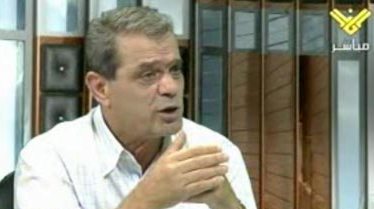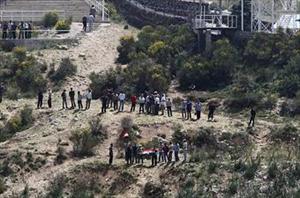Former MP Najah Wakim says in interview with Al-Manar website that US, and behind it some Arabs alongside Israel, were seeking to deploy the ‘creative chaos’ project in the region through Syria
Najah Wakim to Al-Manar Website:
US Seeking Sedition in Lebanon… Things Will Get Worse
Syria Incidents Not Spontaneous… Conspiracy Will Fail
US Speaks of Human Rights in Syria… Forgets Them in S.Arabia
Nakba and Naksa Day Events: New Palestinian Intifada
No Government Soon… Lebanon Has No Sovereignty
Amending Taif Accord Does Not Resolve Current Crisis
 The head of the People Movement in Lebanon, former MP Najah Wakim, said that the United States, and behind it some Arabs alongside Israel, were seeking to deploy the ‘creative chaos’ project in the region through Syria, with the aim to dismantle this Arab country and therefore the whole region.
The head of the People Movement in Lebanon, former MP Najah Wakim, said that the United States, and behind it some Arabs alongside Israel, were seeking to deploy the ‘creative chaos’ project in the region through Syria, with the aim to dismantle this Arab country and therefore the whole region.
He expressed belief that the Syrian people would triumph in the face of the conspiracy targeting their country, and warned that this conspiracy targets the whole nation.
In an exclusive interview with Al-Manar website, Wakim said that the Naksa Day events (June 5) signaled the launch of a new Arab and Palestinian Intifada. He said those events uncovered the truth of the American administration which speaks of human rights in Syria and forgets them when it comes to, for example, Saudi Arabia.
While noting that the internal crisis in Lebanon was not governmental but one related to the whole system, he stressed the issue was deeper than amending the Taif Accord. He said that Lebanon doesn’t enjoy, at this stage, neither a state nor officials with a true vision.
Wakim warned that the US was pushing towards sectarian sedition in Lebanon as part of the ‘creative chaos’ scheme in the region, and said that issues will get worse at all levels, especially at the security level.
DISMANTLING SYRIA WILL LEAD TO DISMANTLING REGION Wakim told Al-Manar Website that there was a big conflict taking place in Syria as part of the conflict over the whole Middle East region.
Wakim told Al-Manar Website that there was a big conflict taking place in Syria as part of the conflict over the whole Middle East region.
He said that the United States, and behind it some Arab regimes alongside the Israeli enemy, was seeking to impose what is known as the ‘creative chaos’ project through Syria, with the aim to create sectarian conflict in Syria in order to dismantle it, and therefore divide the whole region.
Wakim expressed belief that the calls for reform were just and patriotic, but said that “the quantity of weapons and the emerging armed gangs raise a number of question marks, as foreign hands stand behind them particularly the US and the NATO with the aim to unleash Israel’s hand in the region.” He said that the events taking place in Syria were not spontaneous, but rather organized and prepared a long time ago.
The former MP stressed the people of Syria were against the current situation and that they are convinced that the conspiracy targeting their country actually targets the whole nation. Wakim said he trusted the wisdom of the Syrian people and recalled that Syria had more than once overcame difficult circumstances.
IT IS MORE THAN A MESSAGE… IT IS A NATION’S INTIFADA! Turning to the Naksa Day events (June 5), Wakim said that they signaled the launch of a new stage in the region, and expressed belief they carried out a promise of a new Intifada for the Palestinian nation in the face of the Zionist entity.
Turning to the Naksa Day events (June 5), Wakim said that they signaled the launch of a new stage in the region, and expressed belief they carried out a promise of a new Intifada for the Palestinian nation in the face of the Zionist entity.
On the 44th anniversary of Naksa (setback) Day, Palestinians, especially in Syria, marked the occasion with protests behind the barbed wire of the occupied town of Majdal Shams in the occupied Golan Heights, when Israeli occupation forces shot and killed 23 unarmed protesters, and injured dozens others.
Wakim underlined the June 5 events have uncovered the real stance of Washington. “The American administration speaks of human rights in Syria and pretends to have forgotten them in Saudi Arabia where it seems there are neither humans nor rights. The same administration doesn’t find one human who has rights in Palestine,” he said.
“Regardless of the American known enmity towards our nation and people, the Golan events constitute the beginning of a new Palestinian and Arab Intifada,” Wakim said, while expressing belief that this Intifada would make strategic changes in the region.
Asked whether there was a Syrian message behind the events, Wakim said he doesn’t personally agree with such analysis. “If Syria was delivering a message through Golan, then who could be sending a message through South Lebanon and Palestine?” he wondered.
He concluded that the issue was more than a message. “It is related to the Intifada of an entire nation which will not acknowledge the Israeli enemy. This Intifada would continue, regardless of the developments in Syria,” he said.
AMENDING TAIF IS NOT A SOLUTION Turning to domestic issues, the former lawmaker denied Lebanon was facing a governmental crisis. “The current crisis is in fact related to the entire political system,” he explained. “What would change if a government was formed or not?” he wondered.
Turning to domestic issues, the former lawmaker denied Lebanon was facing a governmental crisis. “The current crisis is in fact related to the entire political system,” he explained. “What would change if a government was formed or not?” he wondered.
Wakim expressed belief the new government would not see birth in the imminent future, “as Lebanon is not sovereign enough to form its government alone.” “Lebanon is ruled by many foreign sides. Whenever these sides are in harmony, things become easier and whenever they are engaged in a conflict, which is today’s situation, Lebanon’s becomes at the bottom of the region’s priorities,” he remarked.
Wakim expected the crisis would become even more complicated and said that Lebanon did not have the privilege of being a state that has politicians with a true vision. He stressed the issue could not be resolved by amending the Taif Accord, because the crisis was not related to the powers of the President of the Republic or the Parliament Speaker. “It is deeper than that. It is a crisis of an entire system built on sectarianism. The Taif Accord only sought to beautify the system without touching the sectarian issues,” he went on to say.
Asked about the protests to end the sectarian system in Lebanon, Wakim said they represented the first round of the uprising. “Following this first round, we had to evaluate the whole issue. Yet, I believe the next rounds will take place very soon.”
US SEEKING SEDITION On the prospects of facing the challenges, Wakim said “the Lebanese are not able to face the upcoming challenges in such a state and amid the current political void…I believe things will get worse in the future.”
On the prospects of facing the challenges, Wakim said “the Lebanese are not able to face the upcoming challenges in such a state and amid the current political void…I believe things will get worse in the future.”
He pointed out to two main challenges: “The first was raised by US President Barack Obama before the American Israeli Public Affairs Committee (AIPAC) in which he accused Hezbollah of carrying out what he called “political assassinations”, while the second was reports about the imminent release (by the Special Tribunal for Lebanon) of the already known indictment in the assassination case of former Prime Minister Rafiq Hariri.
Wakim said the US was pushing towards sectarian sedition in Lebanon as part of the ‘creative chaos’ project in the region. He warned issues will be worse at all levels, including the security one.
Asked about the reasons of his apparent pessimism, Wakim answered: “When you see such a state, don’t you feel you’re going to pass out?”
